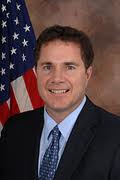 Though it will fall short of the intense attention we receive during Presidential years, November 2014 in Iowa will develop into a fierce battleground for both political parties. In spite of the gubernatorial election on the ballot the prize for each side will be the open US Senate seat vacated by Tom Harkin.
Though it will fall short of the intense attention we receive during Presidential years, November 2014 in Iowa will develop into a fierce battleground for both political parties. In spite of the gubernatorial election on the ballot the prize for each side will be the open US Senate seat vacated by Tom Harkin.
While it is a virtual certainty that Bruce Braley will be the Democrat candidate in this race the Republican field is wide open, with no one yet confirming a run. As it stands now Rep. Steve King has been given the “first right of refusal†by fellow potential candidates Kim Reynolds and Bill Northey, and it is widely believed he will have decided by May 1st. One way or another, the field will become clear soon after. In the meantime, here is a first look at the dynamics if the matchup were King vs. Braley.
The Numbers
On last weekend’s Iowa Press Steve King referred to a Republican winning the seat as a “slightly uphill battleâ€â€”and the numbers indeed bear this out. Though they were highly inflated due to it being a Presidential election year, the cumulative votes cast last year in Iowa’s four Congressional districts reveal the Republican will be starting in an electoral hole. In total the four Congressional Democratic candidates (Braley, Loebsack, Boswell, and Vilsack) received 772,387 votes, while the four Republican candidates (Lange, Archer, Latham, and King) received 726,505 votes (D+45,882).
Obviously this is too broad a measure to be definitive but it does give a feel for the obstacles the Republican will face. Far more informative is looking at how Braley and King faired in their individual races. In this scenario the candidate and the electorate in their districts remain the same and the only variable that changes is the opponent. What the numbers show is that Bruce Braley is a better performing candidate than Steve King—something that will likely come as a surprise to many Republicans.
Last cycle Braley went in with a 25,420 voter registration advantage in HD 1 over Ben Lange but won by 59,957—beating the numbers by 34,537. Meanwhile King went in with a 50,396 voter registration advantage in HD 4 over Christie Vilsack but won by only 30,593 votes—losing the numbers by 19,803.
Yes Braley and Vilsack’s numbers were surely inflated due to Obama being on the ballot, and King and Lange were done no favors by Romney’s trouble with Independents, but there is still cause for concern. This is due to the fact that some of this inflated total was surely offset by King facing a far weaker opponent than Braley—Lange was a proven campaigner who came within 4,000 votes of beating Braley in 2010 while Vilsack proved to be an awful candidate who ran a terrible campaign.
These facts are certainly not to suggest a Republican cannot win the seat, they merely offer some context on the difficulties involved and likely explain the caution potential candidates are proceeding with.
Braley vs. King on Paper
The perplexing thing about this potential matchup is that on paper King is a far superior candidate to Braley. While King started an earth moving construction company from scratch, Braley is a trial lawyer and former head of the Iowa Trial Lawyers Association. Though it is true King has a visceral way of approaching issues and a knack for the ill-worded statement, Braley’s voting record reveals he is without a doubt a west-coast Liberal who just happens to reside in Iowa. In fact, besides voting with Democrats and Obama’s agenda 98% of the time in 2008, 99% in 2009, and 98% in 2010, since January 2007 he has voted 91% of the time with Nancy Pelosi. Among these votes of course are Cap & Trade, Dodd-Frank, Obamacare, and authorizing more than $6 trillion in debt over the last four years.
The number one objective for the campaign of whatever Republican takes on Braley will be getting the word out on his voting record. And if the above facts aren’t enough evidence of his poor decision making for Independents in Iowa—you can add he was one of the first to endorse fellow trial lawyer John Edwards for president in 2008.
My Take
In many Republican circles it has become a common belief that Steve King can’t win a statewide race—I do not concur. Perhaps I’d see more truth in this if the candidate on the other side was a moderate instead of one of the most Liberal politicians in the country—funny how we never hear Bruce Braley can’t win a statewide race.
That being said, I am of the belief that our strongest candidate by a longshot would be Kim Reynolds—and we would not risk a House seat in the process. While he would surely have a shot if he ran, undoubtedly the media would exclusively focus on King’s past statements and ignore Braley’s voting record.
In the end I predict that King will decide against running. Whether he proves me wrong or not, whoever takes up this task will have to run hard. Though this is a realistic opportunity for Republicans the numbers show that it indeed will be a “slightly uphill battleâ€.
